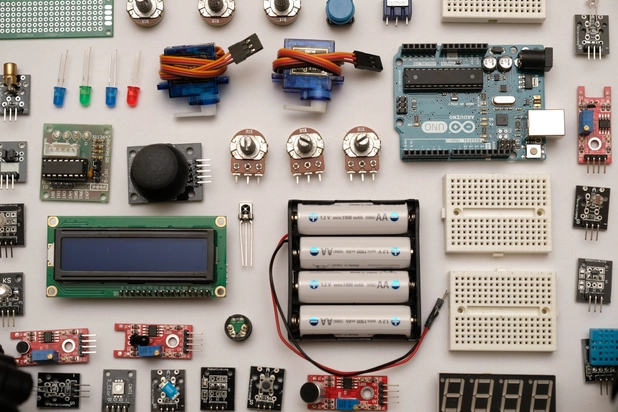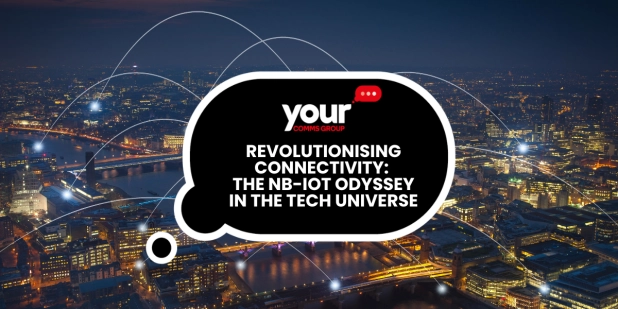IoT in the Workplace: Connecting for Efficiency and Innovation
Integrating IoT (Internet of Things) technologies into the workplace is a practical and effective strategy for organisations seeking to enhance...
2 min read
Your Comms Group : Sep 15, 2022 12:46:00 PM

We’ve talked a lot recently about how the Internet of Things (IoT) can help businesses and people to operate and live more efficiently, and we all know that the IoT is already present in the daily lives of most of the developed world – even if it’s just in the form of your video doorbell.
The IoT is an ecosystem of internet-enabled products, services and processes that can be controlled by an app.
Even though we have yet to see the true everyday potential of it – through driverless cars and truly smart homes – the IoT is arguably the single most important technological development since the internet itself.
Here’s why.
It will change the way you live your life
Most of the time we can choose the extent to which technology touches our lives – for example, we can still choose to bank in a branch and write cheques even though mobile banking means there are millions of people who can take care of their personal finances on their phone.
But there are other things that are beyond our personal control. If you change energy supplier (which in the current cost climate many people are trying to do), for instance, the likelihood is that your new supplier contract will require you to have a smart meter.
The IoT, which runs on also falls into this category. While new homes may be built with the option of running IoT-enabled devices like white goods, lighting, heating, and window coverings, in the future new builds will require you to run those devices.
Make no mistake – the IoT will become a fixture of our lives whether we like it or not.
It will make us more efficient
As the technology spreads and becomes more common, our lives and the businesses that serve us will become more and more efficient. With human involvement increasingly designed out of service delivery, human error will also begin to evaporate.
In turn this streamlining will deliver obvious economic benefits – not least in driving down costs.
And while there are many legitimate arguments about whether this is really a good thing or not, this new world will also create new opportunities to offset the downsides - the advent of the motor car may have decimated sales of horses and wagons, for example, but it created wealth in other ways.
It’s changing the world in remarkable ways
Mobile phone carriers, networks and manufacturers have already seen the opportunities that exist to make that device you carry around with you indispensable in an IoT world.
We have a new generation of cell phones that have seamlessly facilitated the development of human communication, interaction, and activity in ways we never imagined even 10 years ago.
In business, organisations can harvest strategic information and apply processes remotely using commands based on data analytics, they can share and analyse data in seconds, and keep colleagues and customers updated in real time on transactional service and product delivery.
It’s already here
Business transformation is now more rapid and more widespread than at any time in history, and that’s largely down to the IoT.
From logistics businesses like Amazon and Eddie Stobart, to electric vehicle manufacturing and even theme parks, the IoT is used to monitor, correct, accelerate, and iterate the customer experience. And aside from the set-up costs involved, it’s all being done at a fraction of the previous cost.
Increasingly, providers in the private sector are using this technology to improve healthcare. Here at YCG we already work closely with the domiciliary care sector to provide the mobile technology that helps to ensure gold standard service for the patients who receive it.
But hospitals, too, are beginning to move at pace to upgrade to technologies that will allow for better care at lower cost.
The future of IoT
The future is, in many senses, already here. The focus of the global technology market is already squarely on the Internet of Things, and as it proliferates its benefits will begin to be realised in the public domain through making our lives more secure, reducing our need to interact in destructive ways with nature, and enabling us to access better health.
Will it have its downsides? Yes, of course, because all change has downsides. But done well, those disadvantages will be outweighed by its benefits.

Integrating IoT (Internet of Things) technologies into the workplace is a practical and effective strategy for organisations seeking to enhance...

The Internet of Things (IoT) has appeared as an important force for connecting devices and systems to promote seamless communication and data...

We all can agree that Connectivity is the linchpin that stitches together innovation in the Internet of Things (IoT) Universe. Imagine your gadgets...